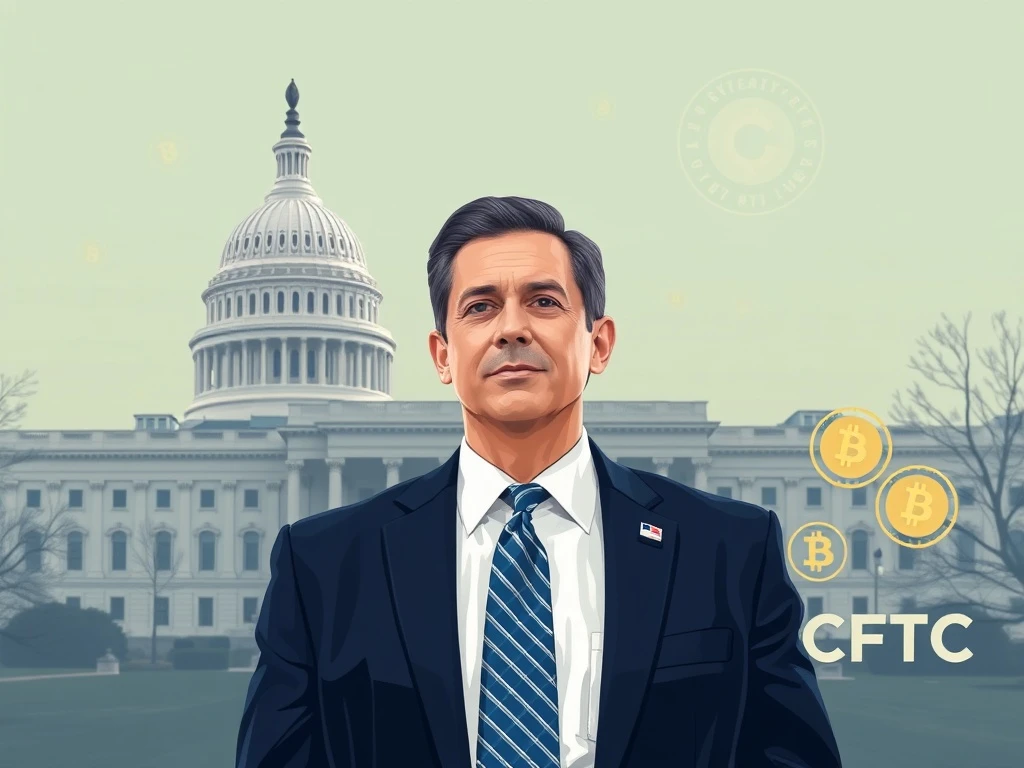CFTC Nomination Unveils Crucial Shift in Crypto Regulation

The cryptocurrency world keenly watches Washington as significant changes unfold within key regulatory bodies. A pivotal moment has arrived with the confirmation of Michael Selig’s CFTC nomination, signaling potential shifts in the landscape of crypto regulation. This development occurs while the agency faces a considerable leadership void, making Selig’s appointment even more impactful for the future of digital assets.
Michael Selig’s CFTC Nomination Confirmed
US Securities and Exchange Commission (SEC) official Michael Selig recently confirmed his nomination by President Donald Trump to chair the Commodity Futures Trading Commission (CFTC). White House crypto and AI czar David Sacks publicly announced Selig as Trump’s chosen candidate. This announcement follows the withdrawal of Brian Quintenz’s earlier nomination, indicating a strategic shift in the administration’s approach to regulatory leadership. Selig’s nomination, while confirmed by him and Sacks, still requires Senate approval. It also sets the stage for the potential departure of acting Chair Caroline Pham, who has indicated her intention to leave once her replacement gains Senate confirmation.
Selig has articulated President Trump’s vision for the United States: transforming the nation into a global “crypto capital.” This goal underscores the importance of regulatory clarity and a supportive environment for innovation within the digital asset space. The move has generated considerable discussion across the industry, highlighting the critical role the CFTC plays in defining the operational boundaries for various cryptocurrencies.
Addressing the Leadership Void Amidst Government Shutdown
The CFTC nomination arrives at a challenging time for the agency. It currently operates with a significant leadership void, with several open seats on its five-member panel. Since Commissioner Kristin Johnson’s departure in September, acting Chair Caroline Pham has been the sole active member. This understaffing complicates the agency’s ability to fulfill its mandate effectively. The situation is further compounded by an ongoing government shutdown, which entered its fifth week. Republican and Democratic lawmakers remain at an impasse over a funding bill, primarily due to disagreements on healthcare cuts and subsidies.
While the Senate can still process legislation during a shutdown, including a potential digital asset market structure bill, lawmakers’ immediate priority remains a continuing resolution to fund government operations. This political backdrop adds another layer of complexity to Selig’s confirmation process and the CFTC’s operational capacity. An understaffed commission struggles to implement new rules and provide the necessary oversight for a rapidly evolving market.
Implications for Crypto Regulation and Digital Asset Markets
Selig’s focus on crypto policies suggests a proactive stance from the CFTC under his potential leadership. The agency is a crucial regulator for many cryptocurrencies, classifying them as commodities. Therefore, the direction it takes directly impacts the operational frameworks for exchanges, derivatives, and other crypto-related financial products. His nomination could accelerate efforts to establish clearer guidelines, potentially benefiting the burgeoning digital asset market.
The industry eagerly awaits concrete steps towards a comprehensive regulatory framework. Clear regulations can foster greater institutional adoption and provide much-needed certainty for innovators. Conversely, prolonged uncertainty can stifle growth and push development to more favorable jurisdictions. The debate over whether specific digital assets fall under the purview of the SEC or the CFTC remains ongoing, making strong leadership at both agencies vital for a cohesive approach.
Expert Perspectives on Regulatory Challenges
Former CFTC Chair Chris Giancarlo, widely known as “crypto dad,” offered valuable insights into the current political and legal environment. Giancarlo emphasized the difficulties an acting chair and an understaffed commission face in implementing crucial rulemaking, such as that required under the CLARITY Act. He stated, “It would be very difficult for the CFTC to implement the rulemaking that’s required under CLARITY Act under an acting chair without a full commission, or at least a partial commission.”
Giancarlo also suggested that the White House understands this challenge. He believes they desire to bring the CFTC up to its full staffing requirements. This would enable the agency to proceed with its core business and implement pending legislation effectively. His comments underscore the urgent need for a complete commission to provide robust oversight and policy direction, especially concerning the intricate nature of crypto regulation.
The Road Ahead for the CFTC and Digital Assets
The withdrawal of Brian Quintenz’s nomination prior to Selig’s highlights the intense lobbying efforts within the crypto space. Reports suggest Gemini co-founders Cameron and Tyler Winklevoss pressed the White House for a different candidate after Quintenz could not assure them on enforcement policies. This illustrates the high stakes involved in these appointments for major industry players.
As of now, the Senate has not scheduled a confirmation hearing for Selig. Furthermore, the White House has not announced other nominations to fill the remaining vacant CFTC leadership positions. However, reports indicate that Trump is considering other candidates, including:
- Nathan Anonick, a professional staff member and counsel to the Senate Agriculture Committee.
- Paul Balzano, a senior professional staff member with the House Agriculture Committee.
These potential appointments, alongside Selig’s, could collectively shape the future of crypto regulation in the United States for years to come. The industry anticipates a fully functional CFTC capable of providing clarity and fostering responsible innovation within the rapidly expanding digital asset market. The swift resolution of the government shutdown and subsequent Senate action on these nominations will be critical for achieving this stability.







